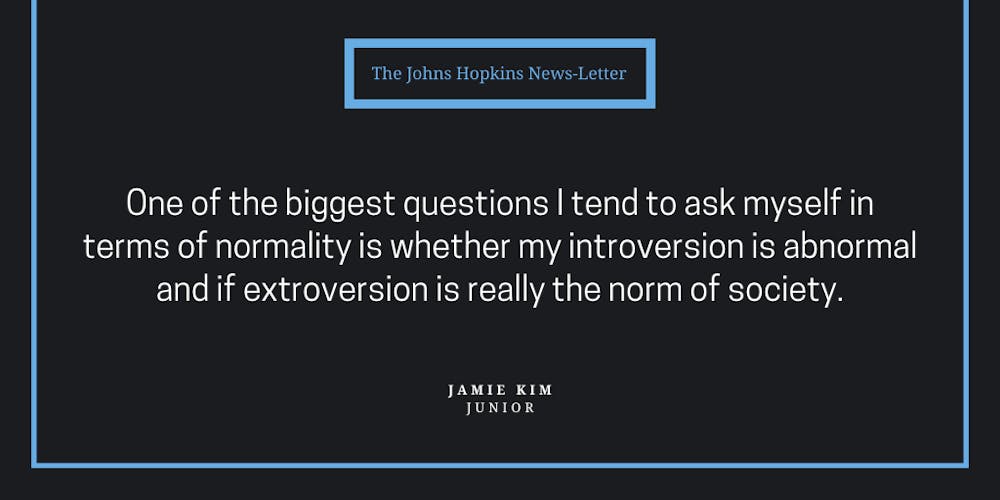
One of the most obvious things that we notice in our everyday lives is that people are distinctly different. There are over 7 billion people sharing the earth. But how many are considered normal? When are people considered abnormal?
To be normal is to adhere to a standard way of thinking and acting.
Depending on your upbringing, generation and culture, what you consider normal may not be normal for someone else. Other countries and cultures have different traditions and practices that they view to be routine, and these traditions and practices evolve throughout the course of time.
Despite the abstract and inconstant nature of normality, we continue to strive for it all our lives because it gives us a sense of self that we need to reassure ourselves that we fit in.
One of the biggest questions I tend to ask myself in terms of normality is whether my introversion is abnormal and if extroversion is really the norm of society.
It is estimated that 65% to 75% of our population is extroverted and the other 30% is introverted. Introverts have to survive silently by themselves in a world full of extroverts that scream “This is the norm!”
This makes life unfair for introverts, especially in this age when everything is a huge display of show and tell. Frankly speaking, even college admissions prefer students who are more outspoken and involved in large events and groups because it makes them seem like they would survive better in our loud and showy world.
If only extroverts could survive in the world, introverts would have been wiped off the face of the earth hundreds of years ago through natural selection. And that’s not true. Perhaps extroverts are better equipped to survive more easily, but introverts also find ways to adapt and make it through.
Undoubtedly, I find myself feeling envious of extroverts, especially at Hopkins. There have been many occasions where I have been in a lecture hall, a question has been thrown in the air and an extrovert immediately answered it with graceful confidence. I would have said the same thing, only I was too timid and the extrovert got to it faster.
Or, the moment when that one extroverted student in my group easily took control as the leader and actually cracked good jokes, making me feel absolutely devastated for being shy. Their charisma made them only more approachable and attractive as they quickly made new friends with everyone in the group.
It’s no secret that those who speak up are the ones who stand out not only to the students but also to the professors and TAs. And in a competitive environment like Hopkins, standing out is sometimes the key to survival.
This leads to a common misconception and point of ridicule that introverts suffer from: we do not have anything to say. The fact of the matter is that we have the same amount of things to say as our outspoken counterparts.
We just process what we want to say in our heads and end up saying it to ourselves without our words ever reaching our lips. Our minds are full of thoughts and feelings that never make it out into the world.
To add more salt to the introverted wound, extroverts are great at forming groups and studying together. I’ve always felt a little bitter at the fact that extroverts don’t seem to feel judgment and can ignore it well, unfazed by how other people might perceive them.
Introverts are more reserved and self-conscious, which can make us more self-reliant, and this unfortunately can create an image of us as being hard to work with. Our quiet demeanor coupled with our independence makes us seem unapproachable and an “anti-team player.”
But believe it or not, we also like to share ideas, study together and spend time with others. We are humans after all, so we also crave human interaction. Though it might not seem like it, we also want to sympathize about how the next exam will most likely destroy our souls.
Despite everything I’ve listed, I don’t find my introverted personality all that loathsome. I pride myself for being independent. My quietness doesn’t make me invisible. I attentively take care of those around me in my own muted way. And my reserve allows me to take a step back and think before I put words on my tongue and think again before I put those words into action.
Hopkins and the world around us is loud and extroverted, but my survival is a testament to the fact that introverts can thrive even with the constant judgment of being “too shy.”
So dear extroverts, I get it.
The world is designed for you, and you boast it with your confident smile and outgoing attitude. But remember, if there’s a mouth to speak, there’s also an ear to listen. Your introverted counterpart is just as normal as you.
Jamie Kim is a junior from New Jersey studying Psychology. Her column explores her journey navigating through life and Hopkins as an introvert.





